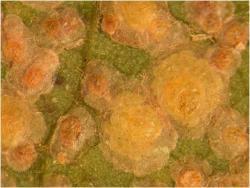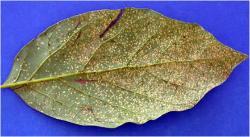Tropical Entomology - Avocado Scales
Coconut Scale, Aspidiotus distructor (Hemiptera: Diaspididae), Florida Red Scale, Chrysomphalus aonidu (Hemiptera: Diaspididae), Coccus spp (Hemiptera:Coccoidae)
-
Description

Scale insects can be of two types, armored scales or soft scales. Armored scales are protected by a distinct, hard, separable shell. Soft scales have a delicate body not protected by a shell and often produce honeydew. Armored scales feed on plant juices. Feeding sites are usually associated with discolorations, depressions and other host tissue distortions. Several kinds of scales, including coconut, Florida red scale, Dictyospermum, and Floridawax may infest avocado.
-
Damage
Part of plant damaged: Trunk, branches, and leaves
-
Management

Aspidiotus destructor an armored scale, infesting avocado leavesCheck for scales and, if needed, apply control measures during May, June or July.
CHEMICAL CONTROL

